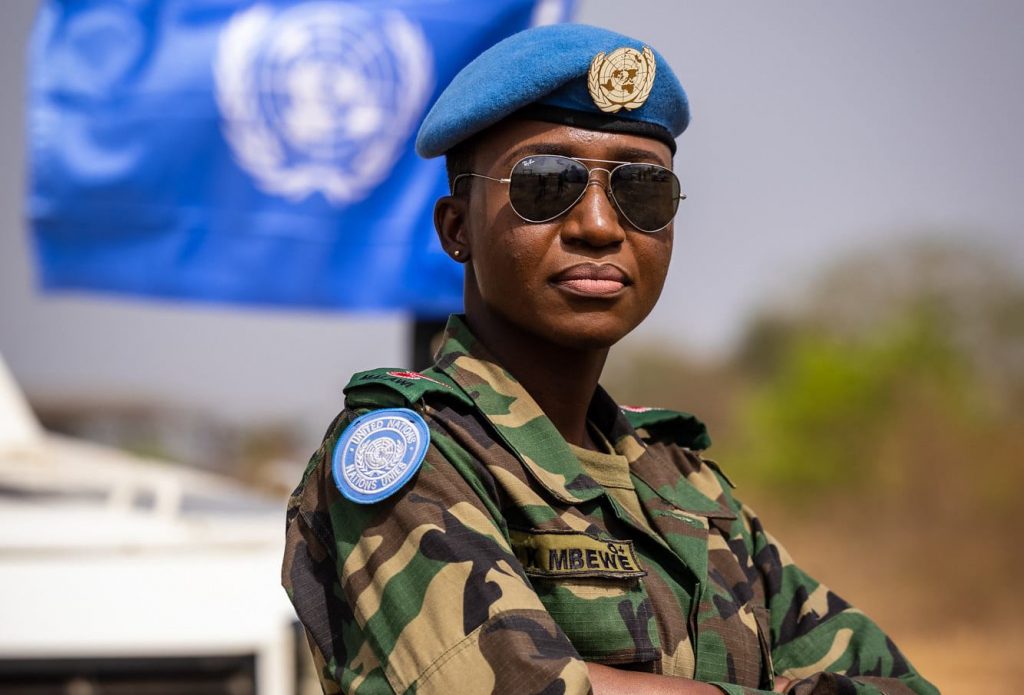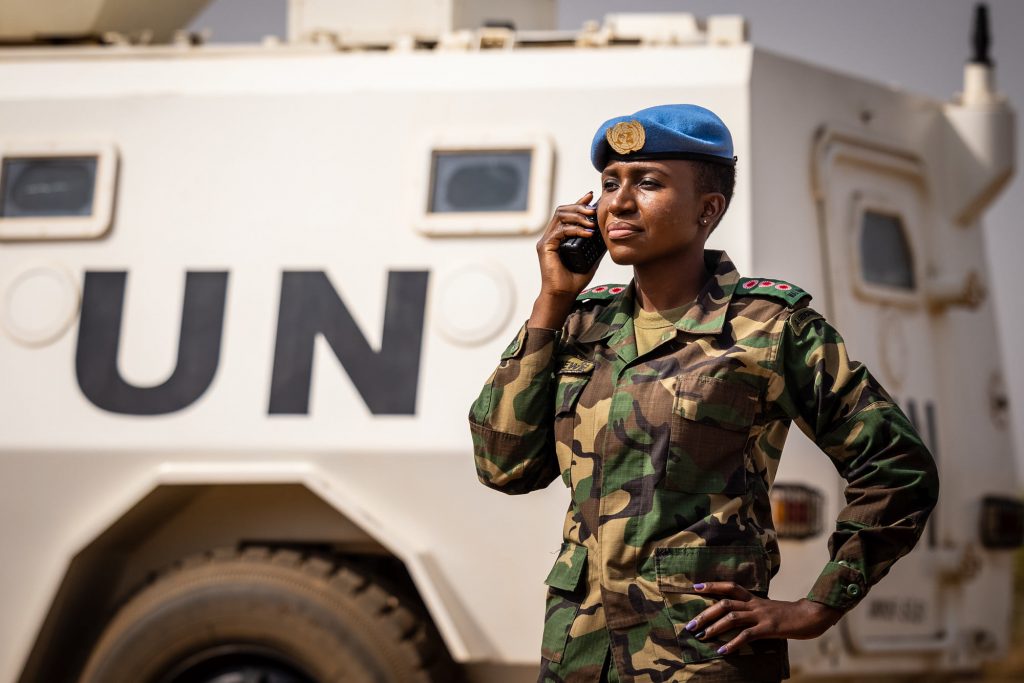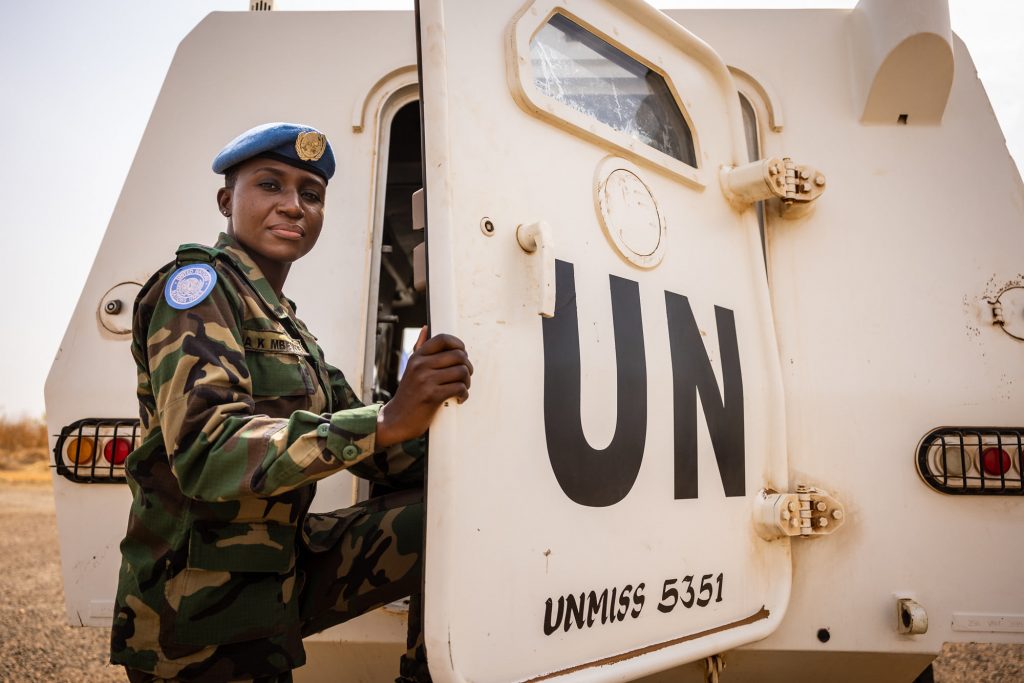Atupele Mbewe: UN Peacekeeper in South Sudan
Atupele Mbewe comes from southern Malawi and is currently deployed to the United Nations Mission in South Sudan (UNMISS). She is a staff officer at the mission’s headquarters in Juba. In her current role as a Civil-Military or CIMIC Coordination Officer, she works with military and civilian colleagues to coordinate all logistic aspects of regular patrols and humanitarian assistance convoys. This is her second UN peacekeeping mission.
She has also served for a year in the United Nations Organisation Mission in Democratic Republic of the Congo (Monusco), Democratic Republic of Congo (DRC).

In this interview, this committed peacekeeper and mother speaks about the importance of United Nations Peacekeeping and why. She believes more women should come forward to participate in professions which were once considered to be male bastions.
Why did you decide to join your country’s armed forces?
Growing up in Malawi I was always fascinated by the work of my country’s uniformed personnel. One such incident is imprinted on me: The protests that broke out after elections in 1994. I was glued to the television and I saw how officers from our army managed to disperse the crowds on the streets while making sure nobody was injured. I was very impressed.

One thing that struck me was that there were no women among the soldiers. It was that day that I made up my mind about joining the army. I wanted to be there, out on the streets protecting people when they needed help, shoulder-to-shoulder with men.
I finally joined the Malawi army in 2013 and I’ve never regretted my decision even once. It was the correct life path for me.
Were your family and friends supportive of your career choice?
You know, even now when any woman says she wants to join the army or she wants to become a police officer, I think it’s a given fact for parents or family members to dissuade them at the very outset. There’s a sense that these are ‘tough’ professions that are more geared for men rather than women.
My close relatives supported me, but were worried. They didn’t know whether I would be able to cope with the rigorous training or the demands of the job. I think over time, they have seen how fulfilled I am career-wise and that’s eased their minds, though they still haven’t given up worrying for me.
How did you become a UN peacekeeper? Is this your first mission?
When I first joined the Malawi Defence Forces as a rookie, I would see senior officers being sent to the United Nations to represent our country internationally. My chance to wear the iconic Blue Beret came some five years later when I was selected to be part of my country’s troop contribution to Monusco in the Democratic Republic of Congo. This was in 2018-2019. UNMISS is my second time serving for the cause of international peace and security.
What are your responsibilities at UNMISS and what is your typical day like?

At UNMISS, my role is that of a CIMIC or Civil-Military Coordination Officer. Simply put, I work with my military and civilian colleagues to make sure the mission can effectively do what it came here for—protect civilians. I coordinate all logistic aspects of regular patrols and humanitarian convoys.
South Sudan is a beautiful country with a unique culture and I’m proud to be able to contribute to the mission’s work in building durable peace here.
It’s a challenging role and I need to be on top of my game all the time, especially because of the Covid-19 situation. Our work doesn’t stop at any time because the communities we are here to serve need us even more when there is such a significant health and safety threat.
What impact do you think female peacekeepers have on the local population?
In both Congo and South Sudan, women and young girls have been disproportionately affected by years of conflict and civil war. When women in these countries see female peacekeepers, they immediately connect with them and want to be like them. I believe we serve as role models for host populations and make missions far more effective because often, women feel more at ease sharing their lives with other women.
What would you say to young girls and women about considering a career in peacekeeping?
If you truly want to have a role in bringing about positive social change, you should consider a career in UN Peacekeeping. Many women across different countries face innumerable hardships; by being a peacekeeper you can make a tangible difference their lives.
Who is Atupele?
I am Captain Atupele Mbewe, born on September 9 1989. My mother comes from Mangochi and my father from my Likoma Island. I am a mother to an 11-year-old boy. I was raised by my aunt Mrs. Mbewe in Mangochi after the death of my mother in 1992. My father later passed on in 2001. I did my primary school at St Augustine One F.P school and my Secondary at St Monica Girls Community School in Mangochi from 2002-2007. I graduated with a degree in Bachelor of Arts in Humanities from Chancellor College in 2011.
Give us a brief background to your career
Joining the military in 2013, I am one of the few female paratroopers in Malawi Armed Forces. I was posted to Parachute Battalion after my commissioning in 2014 where I served as a platoon commander, and a quarter master. However, most of the time, I worked as a training officer at Malawi armed forces college and have trained many combat courses. In 2020, I was posted to the Malawi Defence Force Headquarters at Logistics Department as a staff officer; an appointment I held till I was deployed for peace keeping at United Nations Mission is South Sudan.
What does one need to become a soldier?
To become a soldier, you need to have qualifications. It sometimes depends on what you are applying for. To become a regular soldier, you need to have an MSCE, to become an officer; you need to have a degree. If you want to be a military lawyer or a doctor, one needs to have a specific qualification for that job. All in all, school is important for one to become a soldier and one needs to have the will to do it. It is not about being a male or female. I saw men dropping out from our cadet’s training and during our basic airborne training, but I and my female colleagues managed.
To become a peace-keeper, one has to be experienced in what he or she is being deployed for and needs to have a heart and willingness to help other people who need those services for the better of humanity.





